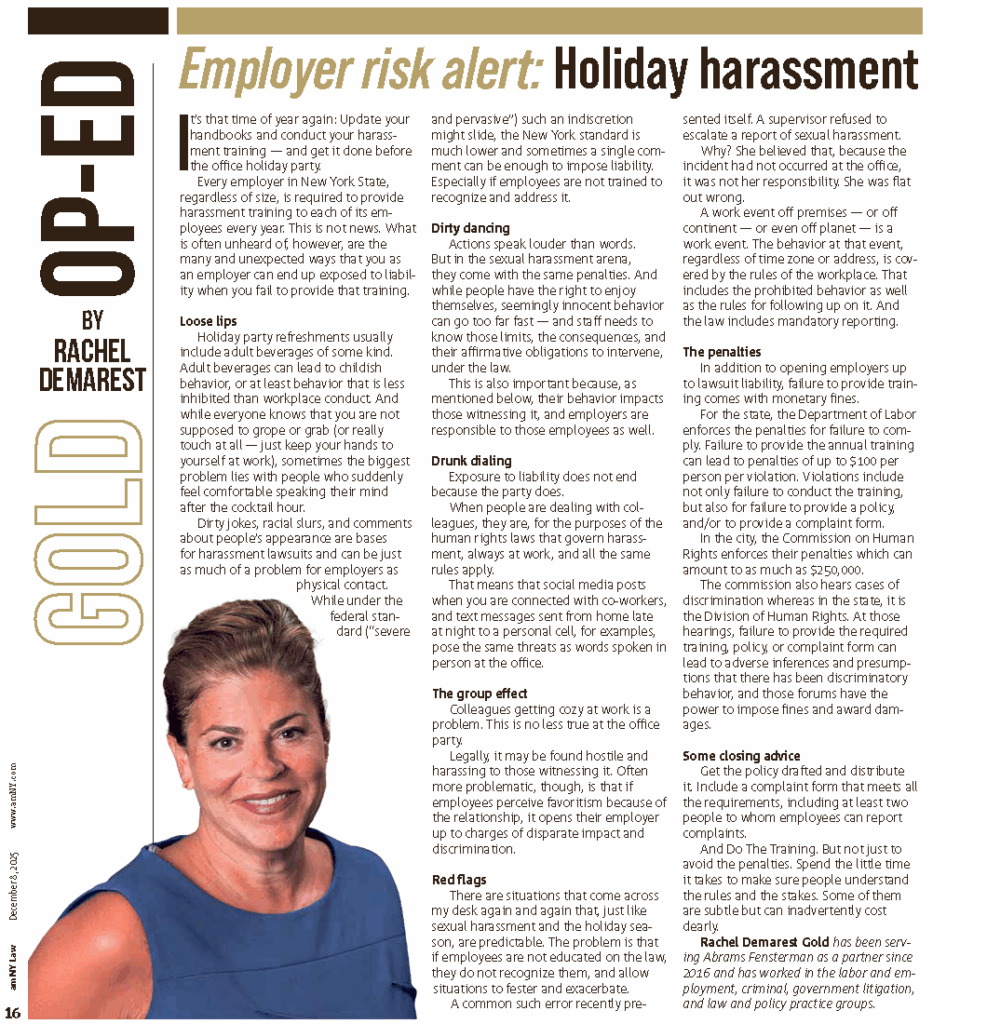By Justin Kelton | February 22, 2019
Judge Furman’s decision in Douglas Elliman v. Firefly Entertainment affirms the longstanding rule in New York that a broker seeking commission in connection with a sale of real estate must prove that it was the “procuring cause” of the transaction.
Entities associated with pop star Taylor Swift prevailed in a recent lawsuit by a real estate broker seeking commissions of more than $1 million in connection with Swift’s purchase of a townhouse, located at 153 Franklin St. in Tribeca (the townhouse), for $18 million. The decision by Judge Jesse Furman of the U.S. District Court for the Southern District of New York provides valuable guidance regarding how courts evaluate claims brought by brokers seeking commissions in the notoriously rough-and-tumble world of New York City real estate.
While brokers and parties often assume that introducing a purchaser to a property is sufficient to entitle the broker to a commission, New York law requires significantly more.
Douglas Elliman Introduces the Purchasers to the Townhouse, Which They Buy Eight Months Later.
In Douglas Elliman v. Firefly Entertainment (https://www.law.com/newyorklawjournal/almID/1548427344NY18CV1381/), 18-CV- 1381 (JMF), real estate brokerage Douglas Elliman (Elliman) claimed that it introduced the purchasing entities (the entities) to the townhouse and, over several months, took various steps to facilitate a sale. Specifically, Elliman claimed that it measured the property using a laser device, obtained blueprints, identified certain unique characteristics about the townhouse that were desirable to the purchaser, and “engaged in preliminary negotiations with the owner.” After that, Elliman’s involvement ceased.
Eight months later, the entities bought the townhouse for $18 million, using a different real estate broker, who was paid a commission in connection with the transaction. Memorandum Opinion & Order, Dkt. No. 20 (the decision) at p.1. Elliman sued Swift’s entities, alleging, inter alia, a breach of contract, demanding 6 percent of the purchase price, or $1.08 million, in damages.
Judge Furman Rejects Elliman’s Claim for a Commission, Because Elliman Lacked a Contract and Was Not the ‘Procuring Cause’ of the Sale.
Judge Furman began his analysis by noting that, under New York law, Elliman’s lawsuit depended on the existence of a valid contract. To determine whether such a contract existed, the court looked to whether there was an agreement between that parties with terms that were sufficiently definite to be enforced. Judge Furman noted that, with respect to compensation:
a term qualifies as insufficiently definite where the amount can[not] be determined objectively without the need for new expressions by the parties. Compensation may be calculated with reference to industry standards or customs, but in that case the plaintiff must establish that the omitted term is fixed and invariable in the industry in question.
Decision at p.3 (internal quotation marks and citations omitted).
Judge Furman noted that, although the transaction was large and involved a celebrity client, and although Elliman was seeking a seven-figure commission, the plaintiff could not point to any formal contract with the defendants.
Instead, Elliman’s claims were based on a single email from an employee of the defendants, stating:
This email is intended for your use with the owner of 153 Franklin. This is to confirm that we Firefly Entertainment/13 Management are working with you solely regarding the viewing and any other needs at 153 Franklin. There will not be any other lines of communication outside of myself. Thank you and please let me know if you need anything further.
Decision at p.3.
Judge Furman found that “those words do not come close to establishing that [the defendants] agreed to use Douglas Elliman as an exclusive agent for the purchase of 153 Franklin Street, let alone that they agreed to pay the company a seven-figure commission in the event that they purchased the property without regard for whether the company’s agent provided any assistance in the transaction.” Decision at p.3. Rather, Judge Furman found that the email merely evidenced an “agreement to agree,” since it lacked most of the materials terms of a real estate brokerage agreement, including the amount of the commission and the scope and duration of the agreement.
The court also noted that Elliman could not succeed under a quasi-contract theory because it could not prove that Elliman was “the procuring cause of the sale.” Decision at n.1. The court reasoned that a broker “does not automatically and without more make out a case for commissions simply because he initially called the property to the attention of the ultimate purchaser.” Id. (citations omitted). Instead, “there must be a direct and proximate link, as distinguished from one that is indirect and remote, between the bare introduction and the consummation.” Id. (citations omitted).
Thus, because Elliman admitted that it had no contact with the defendants for many months prior to the sale, “it plainly was not the ‘procuring cause of the sale.’”
The Takeaways
Judge Furman’s decision in Douglas Elliman v. Firefly Entertainment affirms the longstanding rule in New York that a broker seeking commission in connection with a sale of real estate must prove that it was the “procuring cause” of the transaction. To establish liability under the “procuring cause” doctrine, a broker must allege more than a tenuous, tangential, or attenuated connection to the sale. Rather, it must establish “a direct and proximate link.” Given this mandate, brokers and parties would be well served to make their intentions clear at all stages of their relationships. Moreover, should a dispute arise, the parties should consult with experienced counsel to evaluate whether sufficient facts exist to support a claim for commission.
Justin T. Kelton is a partner at Abrams, Fensterman, Fensterman, Eisman, Formato, Ferrara, Wolf & Carone, where he focuses on complex commercial litigation. He can be reached at [email protected].
Reprinted with permission from the February 25, 2019 edition of The New York Law Journal, © 2019 ALM Media Properties, LLC. All rights reserved.
Further duplication without permission is prohibited. ALMReprints.com – 877-257-3382 – [email protected].





